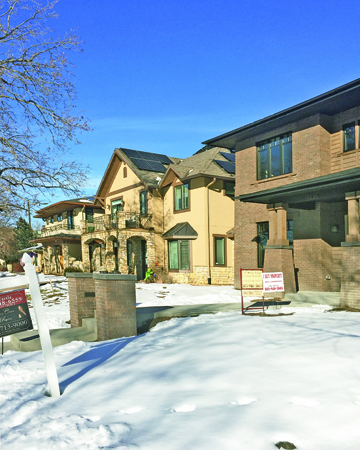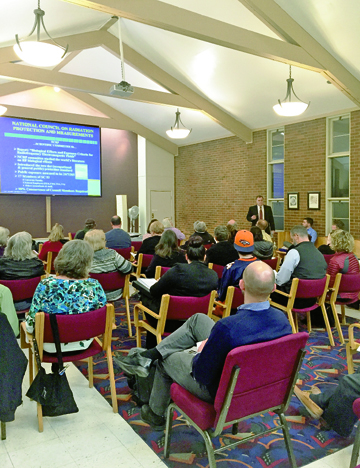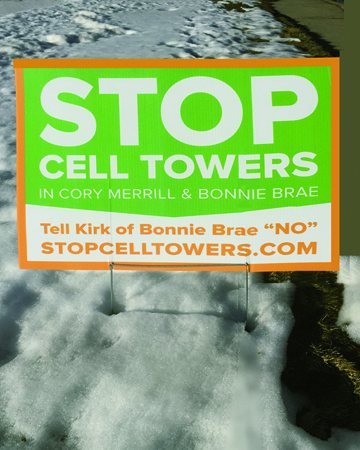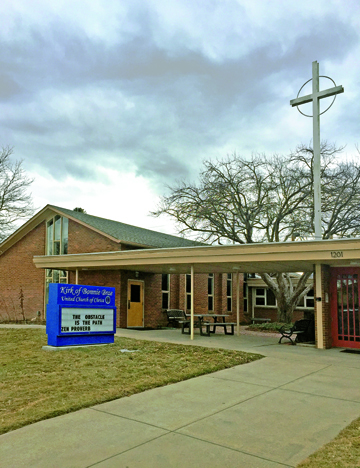Could Crash Home Values, Create Safety Concern
by Glen Richardson
Homeowners in Denver’s Cory Merrill neighborhood are all charged up about Verizon Wireless putting up a 50-foot cell phone tower on the Kirk of Bonnie Brae Church property at 1201 S. Steele St. Verizon and the church are in negotiations to put the tower above a preschool and less than 20 feet from residences.
United in numbers, fuming homeowners in this neighborhood of winding streets and mature trees say it would lower property values and decrease school funding. Even more worrisome they say is that the church does not have a large enough property site to ensure a properly engineered “fall zone” for the tower. A fall zone is the necessary distance a tower needs to be from residences, schools and other structures should the tower collapse. Minimally the distance is considered to be 110% of the height of the tower, or in the case of Kirk of Bonnie Brae a setback of 55 feet.
Area residences point out that if constructed the tower’s setback at Kirk wouldn’t be close. “It would sit within 10 feet of existing power lines and an alley, 20 feet from adjacent homes, the day care center and church. Everything and everyone living and working within a 55 foot distance from the tower will be at risk,” they warn. Furthermore, they articulate that in the event of an accident Steele St. and Arizona would be blocked, inhibiting first responders and impacting evacuation routes.
What’s At Stake?
Developed in the 1940s and ’50s, homes in Cory Merrill range from small but unique original houses, to multi-million dollar custom built dwellings. The neighborhood is east of University, North of I-25, West of Colorado Blvd. and South of Mississippi. Kirk of Bonnie Brae was founded as a Congregational Church in 1947 and is affiliated with the United Church of Christ, a mainline Protestant denomination. The name Kirk is the Scottish word for Church, fitting for the neighborhood whose name also has Scottish origin (Bonnie Brae means beautiful hill).
as a Congregational Church in 1947 and is affiliated with the United Church of Christ, a mainline Protestant denomination. The name Kirk is the Scottish word for Church, fitting for the neighborhood whose name also has Scottish origin (Bonnie Brae means beautiful hill).
Current real estate studies show that proximity to cell towers reduces the value of a home by 20.7% to 21%. Approximately 130 homes were sold in the Cory Merrill neighborhood within the last 12 months. Furthermore, real estate values have appreciated 4.1% since Feb. 2015. Prices for homes ranged from $286,900 (least expensive) to $1,633,000 (most expensive). Neighborhood leaders say they are concerned that, “The ability to build any real increase in value within the neighborhood would be irreparably harmed.”
Verizon says the area is in need of a new wireless tower site, “based on zoning areas and how it will affect the area network, and would enhance coverage in the neighborhood.” The tower would be a 50-foot canister pole that would look like a flagpole and house all wiring and antennas inside a 4 ft. x 4 ft. footprint. Verizon also admits it could do a “monopine” design (that would make it look like a tree) but suggests, “The light pole design would work better and better integrate into the neighborhood and environment.” Verizon also has an option to add other carriers to the tower if they are approached. Construction could start as early as March-April and would take approximately 90 days.
Residents Speak Up
Once again it’s business as usual in Denver, suggests resident George Mayl who lives on South Garfield St. “Tear down this to build bigger and bigger. Let’s place a 50 ft. monolith smack dab in the middle of a residential neighborhood,” he fumes. He notes the church site is right across the street from the John Paul II Center. Many — he thinks maybe all of the 2,250 residents in Cory Merrill — believe this is a bad idea and will be unsightly too boot. “I would tell Chronicle readers where Verizon can ‘stick’ their tower but then you couldn’t print it,” Mayl says of the plan. “Want reception? Place it in Mayor Hancock’s backyard and see the reception it will receive,” he urges.
will receive,” he urges.
Marti Freeman, President of the Cory Merrill Neighborhood Association notes, “What is most interesting about this situation is that the Denver zoning code does not entirely protect residential areas, such as a neighborhood like Cory Merrill, from a 50 foot Tower Structure being placed less than 35 feet from residents property lines.” She wants residents to know that the Kirk of Bonnie Brae Church is zoned residential. Thus Freeman strongly suggests, “Engaging in this negotiation with Verizon is irresponsible and inconsiderate on behalf of the church.” Furthermore she believe the tower on their property in such proximity to neighbors’ homes and backyards, a preschool with a playground plus a major throughway “will create a nuisance for our neighborhood, potential danger, and be aesthetically unappealing potentially diminishing property values in this highly desirable and rapidly developing neighborhood.”
As a final point she tells the Chronicle, “Denver zoning laws should be updated to reflect and meet the needs for great telecommunications services in our residential areas, but not at the expense of our neighborhoods and citizens.” The City of Denver, of course, will review the Verizon request internally and administratively albeit that seldom means a good deal. Approval by the neighborhood association is not required.
Deaf Ear?
Resident Trish Kinkel is even more resolute and adamant: “I do not believe anyone should have the right to construct anything on their property that detrimentally affects the safety, quality of life, and property values of their neighbors.”
She believes the Kirk of Bonnie Brae has turned a deaf ear to their neighbors concerns and continues to negotiate with Verizon. “Come on, a 50 ft tower without an adequate engineered fall zone next to a day care center and existing homes and their own church? It’s all about the money for the church. They don’t care about us,” she concludes.
Area residents haven’t been told a nd the church isn’t saying what Verizon is offering the Kirk to lease the space. Speculation is that the figure is around $1,500 per month. A report by AirWave Cell Tower Consultants reveals that in 2015, “we saw cell sites paying between $100 per year to over $156,000 yearly.” According to the consulting firm, all lease rates regardless of carrier or cell tower developer are site specific and vary from location to location and are based on the demand for coverage and the availability of potential locations to lease ground space, tower space or rooftop space. What is the risk to property owners such as Kirk of Bonnie Brae? “With the possibility of cell phone technology changing (to satellite or other technology), the cell tower company could simply stops paying, they suggest.
nd the church isn’t saying what Verizon is offering the Kirk to lease the space. Speculation is that the figure is around $1,500 per month. A report by AirWave Cell Tower Consultants reveals that in 2015, “we saw cell sites paying between $100 per year to over $156,000 yearly.” According to the consulting firm, all lease rates regardless of carrier or cell tower developer are site specific and vary from location to location and are based on the demand for coverage and the availability of potential locations to lease ground space, tower space or rooftop space. What is the risk to property owners such as Kirk of Bonnie Brae? “With the possibility of cell phone technology changing (to satellite or other technology), the cell tower company could simply stops paying, they suggest.

